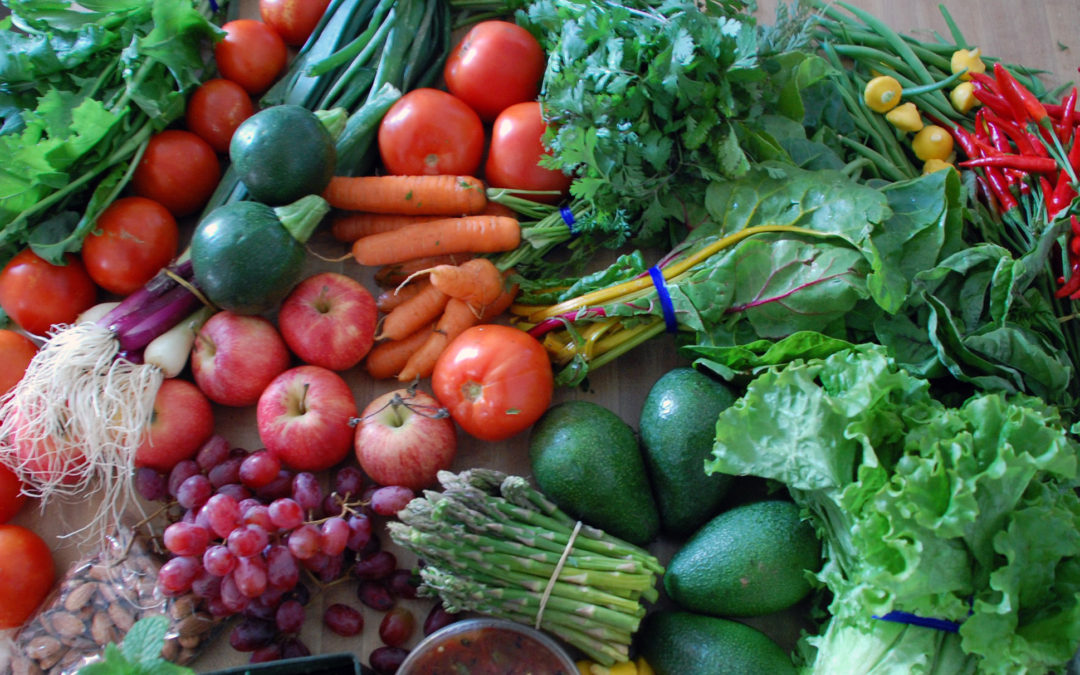Do you suffer from indigestion, bloating, gas, or fatigue? If so, part of the problem could be incompatible food combinations. The shelves of many health food stores are filled with digestive aids, enzymes, or pills for indigestion and gas. Often people are used to eating a variety of foods that normally do not digest well together. These incompatible food combinations can result in indigestion, gas, nausea, fatigue, bloating, and elimination issues. Ayurveda looks deeper than the symptoms of imbalance and searches for the root of why these issues might be happening. Ayurveda believes that it is likely that many of the gastrointestinal issues arise from poor food combinations, a lack of Agni (digestive fire), and high Ama (undigested food and emotions).
According to Ayurveda, there are certain food combinations that disturb the normal functioning of the gastrointestinal system and upset the balance of the doshas (body and mind constitutions). When food is combined improperly it can head to indigestion, fermentation, and gas formation. If these issues intensify long enough without care, it can lead to illness and disease. Incompatible food combining to might seem new and confusing at first, but give it time and it can help tap into food and body awareness. Proper food combining can drastically improve digestion, support the body with deeper levels of nourishment, and impact overall health.
An example is eating a banana and milk. This might sound harmless enough, but it can have lasting effects. Mixing dairy and fruit can diminish Agni (gastric fire) and change the intestinal flora in the gut, resulting in toxins (Ama). If done long term, it can cause sinus congestion, cough, cold, hives, allergies, and rashes.
You can alleviate some of the effects of incompatible food combinations by using spices and herbs when cooking. A strong Agni can be the most powerful way to deal with incompatible food combinations. It is best to start slow with these changes and allow for plenty of time to make any adaptations to your diet.
Here are a few ideas of foods not to combine by category:
1. Dairy and Egg Products
Milk can be incompatible with melons, fish, sour fruits, bananas, Kitchari (mung dahl and basmati rice), and breads with yeast.
Yogurt as a fermented milk product, can be beneficial for your intestinal flora, but can also have bad effects when used with other foods. A big issue commonly used is the mix of yogurt and fruits. Yogurt does not mix well with sour fruits, melons, bananas, berries, and mangos. Hot drinks (like tea and coffee), starches, cheese, and fish also do not mix well with yogurt.
Eggs don’t combine well with milk, cheese, yogurt, fruit, potatoes,
2. Fruits, Vegetables, and Nightshades
Fruits are best to be eaten on their own due to their somewhat acidic nature. They tend to be fairly easy to digest and do so quickly. If they are eaten with other foods there is usually a gap of time it takes to digest the fruit and the more complex food. If this happens, the fruit gets inhibited by more complex foods and can tend to move through the digestive tract too slowly. This can cause fermentation, bloating, and gas.
Fruits can be eaten with other fruits with similar qualities.
Vegetables don’t mix well with lots of fruit or milk. Corn is incompatible with dates, raisins, and bananas.
Nightshades (potatoes, eggplant, peppers, and tomatoes) do not mix well with yogurt, cheese, fruit (especially melons), and milk. The combination of nightshades and cheese can be too taxing on the digestive fire. In Ayurveda, all nightshades are believed to be somewhat hard to digest and can disturb the doshas.
4. Grains and Starches
Starches don’t mix well with bananas, eggs, milk, or dates. Grains don’t combine well with fruit. Grains and Starches can tend to go well with vegetables, beans, meat, fish, seeds, and cheese.
5. Beans
Beans do not combine well with fruit, milk, cheese, yogurt, eggs, meat, and fish. We all love bean and cheese burritos, but beans and cheese both tend to be heavy and often are very difficult to digest. In order to beak them down, they both need a strong Agni (digestive fire). They also have different post-digestive affects on the body. Beans, depending on the type, usually taste astringent and sweet, can be either heating or cooling, and tend to have a pungent post-digestive effect. Cheese is mostly a sour taste. It is usually always heating, and tends to have a sour post-digestive effect. Due to the different post-digestive effects, the body, particularly the colon, can be affected. This can change or impact urine, feces, and sweat. Beans and cheese, when they are eaten together, tend to overwhelm and confuse the digestive fire. Their combined heaviness makes digestion a difficult process, which can often result in poor digestion and the accumulation of Ama.
Food combining is not about black and white rules. It’s a slow process of tapping into awareness and how our dietary choices affect our health. It is a powerful tool for improving digestion and assimilation of nutrients. Ease into it as it can feel overwhelming at first. Start small, be gentle, and tap into your greater awareness of how you’re feeling.
References:
Lad, Vasant. The Complete Book of Ayurvedic Home Remedies. New York: Three Rivers Press, 1998. Print. 10-102.
Lad, Usha and Dr. Vasant Lad. Ayurvedic Cooking for Self-Healing. 2nd ed. Albuquerque: The Ayurvedic Press, 2006. Print. 45-48.
